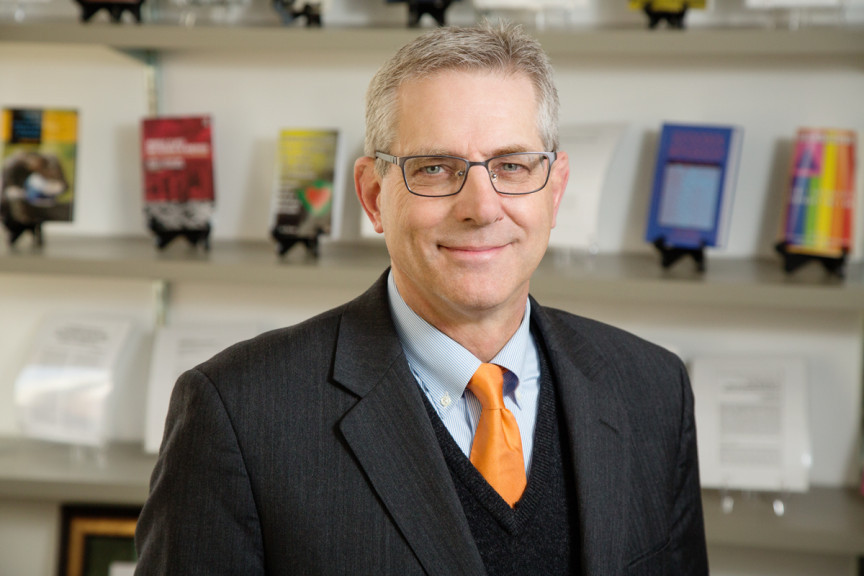U of I professor says student debt leading to job crisis in professional fields

Kevin Leicht, a sociology professor at UI, published a book about the declining respect for professional jobs. Titled “Crisis in the Professions: The New Dark Age,” the book discussed how college debt forces professionals to pursue higher-paying jobs. Photo by L. Brian Stauffer, Courtesy of Sharita Forrest
Professional jobs have become more expensive to acquire and less respected, said Kevin Leicht, a sociology professor at the University of Illinois at Urbana-Champaign.
Leicht published “Crisis in the Professions: The New Dark Age” in March.
The book discusses the effects of college debt on the professional community — a group composed of doctors, lawyers, pharmacists, accountants, engineers and scientists.
“You accumulate a lot of debt to get a professional degree, and then you have a lot of trouble getting out of that,” Leicht said.
“Almost regardless of what you originally wanted to do, you have to go into a highly compensated specialty and live in an urban area.”
Cities provide recent graduates with more job opportunities because businesses tend to form and grow where the most people are, Leicht said.
As agricultural technology advances, farms in rural areas require less work, he said, so there are fewer laborers needed.
“If you grow up in certain parts of the Midwest, it’s been taken granted for a long time that you will leave it,” Leicht said. “Basically, ‘Go to college and leave. There’s nothing to do here.’”
As rural populations thin, they lose money and face difficulties in retaining workers, Leicht said.
When people struggle to find jobs in rural areas, he said they choose to move to the city.
“The longer that goes on, there’s an awful lot of resentment because the young leave, and they don’t come back,” Leicht said.
“The resentment helps to fuel political polarization because it appears as if there’s this distant, educated elite. And this distant, educated elite doesn’t want anything to do with our rural areas.”
Because professionals tend to reside in urban areas, there is no local representation of professionals in rural areas to counteract that narrative, Leicht said.
To obtain professional services, Leicht said people from rural areas must step out of their culture and talk with people who are not embedded in their community.
This polarization between rural and urban areas contributes to the “war on expertise,” which describes the increasing distrust surrounding professional knowledge, Leicht said.
This lack of trust and the increase of misinformation has made physicians’ jobs harder, he said.
“There’s been an enormous amount of pressure on physicians, in particular, to provide specific treatments that are simply not going to work,” Leicht said. “Hydroxychloroquine for COVID is a classic example of that.”
In March 2020, the FDA approved an Emergency Use Authorization to allow hydroxychloroquine to treat adults and adolescents who were hospitalized with COVID-19, according to MedlinePlus.
In June 2020, the FDA canceled the authorization because clinical studies showed the drug to likely be ineffective for treating COVID-19 and to cause “serious” side effects, such as irregular heartbeat, the site said.
The treatment was popularized when President Donald Trump promoted the drug as a potential treatment, according to the JAMA Network.
COVID-19 increased the distrust people already had in professionals, Leicht said. In the last 15 years, he said their expertise has been increasingly questioned.
The gap between professionals in rural and urban areas has only fueled the politicization of expertise knowledge, Leicht said.
“If we want the labor market to be less distorted and we want a more even distribution of professionals around the country, we need to make it cheaper to get a degree,” Leicht said.
High debt not only forces professionals to live in cities, but it also affects what services they can offer, Leicht said.
In the court system, lawyers fighting legal cases for marginalized groups often must do it for free or nearly so, Leicht said.
“Immigration law is a classic example,” Leicht said. “Immigration law is very valuable, but it’s not very lucrative because most of the people [lawyers] talk to don’t have any money.”
Scientists in academia struggle to find funding for their research, Leicht said.
“The academic labor market is getting more and more unappealing,” Leicht said. “The pay is lower, and it’s much harder to get a job in the first place.”
In the medical field, Leicht said many people advocate for universal insurance. However, this system would reduce doctors’ and physicians’ income, he said, which would make it harder for them to pay off their college debts.
In countries with public health insurance, Leicht said medical school graduates often owe very little or nothing at all, unlike U.S. graduates who accumulate $250,000 to $400,000 of debt.
Despite the increasing challenges that professionals face, Leicht said people interested in joining the professional workforce should stay positive.
“If you’re a young person interested in doing one of these things, you should not deter yourself on the basis of what the book tells you,” he said.
Leicht said he has a “reasonably positive” outlook toward the future because he sees people making professional services more accessible.
“If you make professional work arduous enough to get into, people will find other things to do, and then we’ll really be in trouble,” Leicht said.

